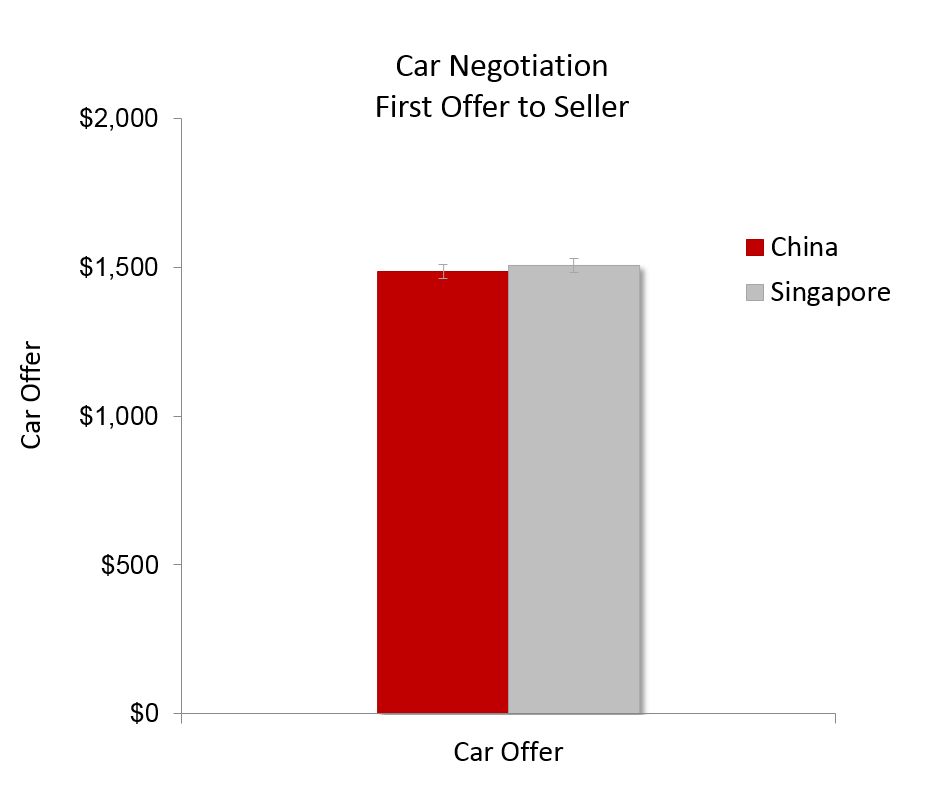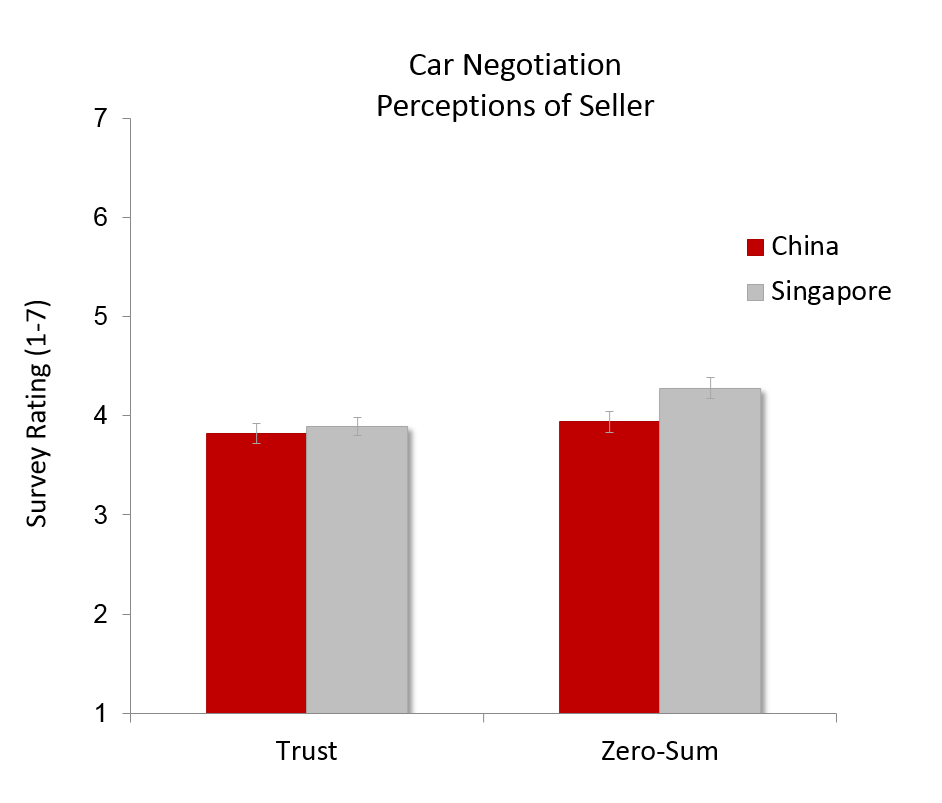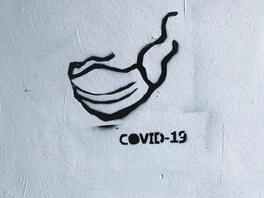Overview
In addition to race, visitors and residents from other countries have faced discrimination on the basis of their nationality. For Chinese residents in particular, renewed trade tensions between China and the U.S. and unflattering dialogue around COVID-19 may cause many Chinese residents of the U.S. to wonder if they too face discrimination in their personal and economic lives.
For example, research shows that Asian job applicants who "whiten" their resumes get more interview call-backs (Kang, et al., 2016). Such bias could be even more prevalent in win-lose or "zero-sum" situations (Norton & Sommers, 2011; Sirola & Pitesa, 2018).
But in spite of the tensions between our two countries, perhaps everyday people are trying to check such discrimination at the door. To find out, we ran a survey experiment to see if Chinese nationality affects economic and perceptual outcomes in a common negotiation setting.
The Experiment
We had 400 people from Amazon MTurk participate in a survey experiment, a vignette scenario involving a negotiation to purchase a used car from a seller who was either Chinese or Singaporean. Participants read the scenario below with either China or Singapore randomly displayed, then answered survey questions to measure their (a) first offer for the car, (b) trust toward the seller, and (c) zero-sum perceptions of the negotiation.
In addition to race, visitors and residents from other countries have faced discrimination on the basis of their nationality. For Chinese residents in particular, renewed trade tensions between China and the U.S. and unflattering dialogue around COVID-19 may cause many Chinese residents of the U.S. to wonder if they too face discrimination in their personal and economic lives.
For example, research shows that Asian job applicants who "whiten" their resumes get more interview call-backs (Kang, et al., 2016). Such bias could be even more prevalent in win-lose or "zero-sum" situations (Norton & Sommers, 2011; Sirola & Pitesa, 2018).
But in spite of the tensions between our two countries, perhaps everyday people are trying to check such discrimination at the door. To find out, we ran a survey experiment to see if Chinese nationality affects economic and perceptual outcomes in a common negotiation setting.
The Experiment
We had 400 people from Amazon MTurk participate in a survey experiment, a vignette scenario involving a negotiation to purchase a used car from a seller who was either Chinese or Singaporean. Participants read the scenario below with either China or Singapore randomly displayed, then answered survey questions to measure their (a) first offer for the car, (b) trust toward the seller, and (c) zero-sum perceptions of the negotiation.
Imagine that you are trying to buy an old used car. You found one for sale and are about to enter a negotiation with the seller, a stranger whom you have never met. You only know the following details:
* The car is a 2005 Ford Taurus
* A friend thinks it's worth about $2,000
* It has a few bumper stickers of the [China/Singapore] flag, but they look easy to remove (the seller is from [China/Singapore])
What is your first offer for the car?
$
To what extent do you agree with the following statements? (1 = Disagree strongly; 7 = Agree strongly)
* When one person gains in this negotiation, the other will lose.
* In this negotiation, if someone gets richer, it means somebody else will get poorer.
* In this negotiation, the interests of both parties are inconsistent.
* I trust this seller.
* The car is a 2005 Ford Taurus
* A friend thinks it's worth about $2,000
* It has a few bumper stickers of the [China/Singapore] flag, but they look easy to remove (the seller is from [China/Singapore])
What is your first offer for the car?
$
To what extent do you agree with the following statements? (1 = Disagree strongly; 7 = Agree strongly)
* When one person gains in this negotiation, the other will lose.
* In this negotiation, if someone gets richer, it means somebody else will get poorer.
* In this negotiation, the interests of both parties are inconsistent.
* I trust this seller.
Results
We found no significant effects for offer amount (diff. = $20.34; p = 0.562) nor trust (diff. = 0.06; p = 0.637). We did, however, find a small but statistically significant effect on zero-sum perceptions (diff. = -0.34; p = 0.021), albeit in the opposite direction. Respondents actually viewed the negotiation as slightly less win-lose when the seller was Chinese, though this effect was quite small. No interactive effects were identified for gender, age, or ethnicity. Excluding 3 respondents from China or 10 respondents from non-U.S. countries did not significantly alter the results.
We found no significant effects for offer amount (diff. = $20.34; p = 0.562) nor trust (diff. = 0.06; p = 0.637). We did, however, find a small but statistically significant effect on zero-sum perceptions (diff. = -0.34; p = 0.021), albeit in the opposite direction. Respondents actually viewed the negotiation as slightly less win-lose when the seller was Chinese, though this effect was quite small. No interactive effects were identified for gender, age, or ethnicity. Excluding 3 respondents from China or 10 respondents from non-U.S. countries did not significantly alter the results.
Conclusion
In spite of the tensions between China and the U.S., participants in our negotiation showed no bias toward our hypothetical Chinese car seller. This doesn't mean that Chinese residents or visitors aren't facing bias in other settings, and it certainly shouldn't downplay the very real racial and ethnic tensions in our world today. But at least this brief experiment provides a sliver of hope for seeing past our differences.
References
Kang, S. K., DeCelles, K. A., Tilcsik, A., & Jun, S. (2016). Whitened Résumés: Race and Self-Presentation in the Labor Market. Administrative Science Quarterly, 61(3), 469–502.
Norton, M. I., & Sommers, S. R. (2011). Whites See Racism as a Zero-Sum Game That They Are Now Losing. Perspectives on Psychological Science, 6(3), 215–218.
Sirola, N., & Pitesa M., (2017): Economic Downturns Undermine Workplace Helping by Promoting a Zero-Sum Construal of Success. Academy of Management Journal. 60(4), 1339–1359.
Methods Note
We used ordinary least squares (OLS) regression analyses to test for significant differences in offer amount, trust, and zero-sum perceptions between our Chinese and Singaporean car seller. For significant differences, the difference between the two groups' averages would be large and its corresponding “p-value” would be small. If the p-value is less than 0.05, we consider the difference statistically significant, meaning we'd likely find a similar effect if we ran the study again with this population. To test whether differences for specific groups differ significantly from their counterparts (e.g., men vs. women) we used OLS regression analyses with interaction terms.
The survey materials and data for this experiment are available on our page on the Open Science Framework.
In spite of the tensions between China and the U.S., participants in our negotiation showed no bias toward our hypothetical Chinese car seller. This doesn't mean that Chinese residents or visitors aren't facing bias in other settings, and it certainly shouldn't downplay the very real racial and ethnic tensions in our world today. But at least this brief experiment provides a sliver of hope for seeing past our differences.
References
Kang, S. K., DeCelles, K. A., Tilcsik, A., & Jun, S. (2016). Whitened Résumés: Race and Self-Presentation in the Labor Market. Administrative Science Quarterly, 61(3), 469–502.
Norton, M. I., & Sommers, S. R. (2011). Whites See Racism as a Zero-Sum Game That They Are Now Losing. Perspectives on Psychological Science, 6(3), 215–218.
Sirola, N., & Pitesa M., (2017): Economic Downturns Undermine Workplace Helping by Promoting a Zero-Sum Construal of Success. Academy of Management Journal. 60(4), 1339–1359.
Methods Note
We used ordinary least squares (OLS) regression analyses to test for significant differences in offer amount, trust, and zero-sum perceptions between our Chinese and Singaporean car seller. For significant differences, the difference between the two groups' averages would be large and its corresponding “p-value” would be small. If the p-value is less than 0.05, we consider the difference statistically significant, meaning we'd likely find a similar effect if we ran the study again with this population. To test whether differences for specific groups differ significantly from their counterparts (e.g., men vs. women) we used OLS regression analyses with interaction terms.
The survey materials and data for this experiment are available on our page on the Open Science Framework.
Popular Experiments
COVID MasksDoes wearing a COVID mask affect how others think of you?
|
Video GamesAre video games more enjoyable than board games?
Does age or gender matter? |
Zero-Sum PoliticsDo Democrats or Republicans view society as win-lose?
|





